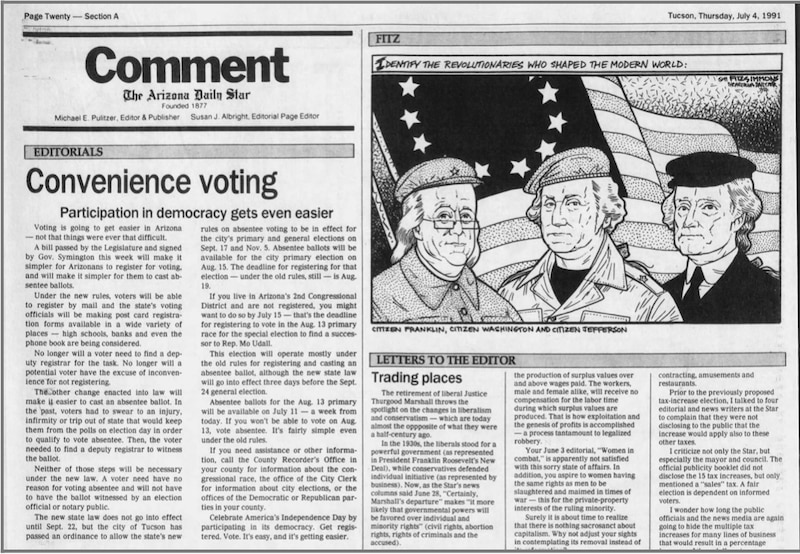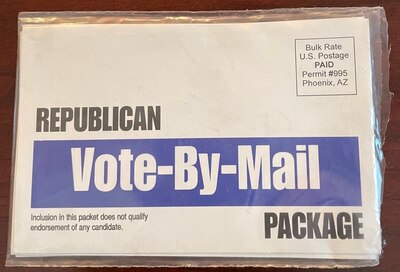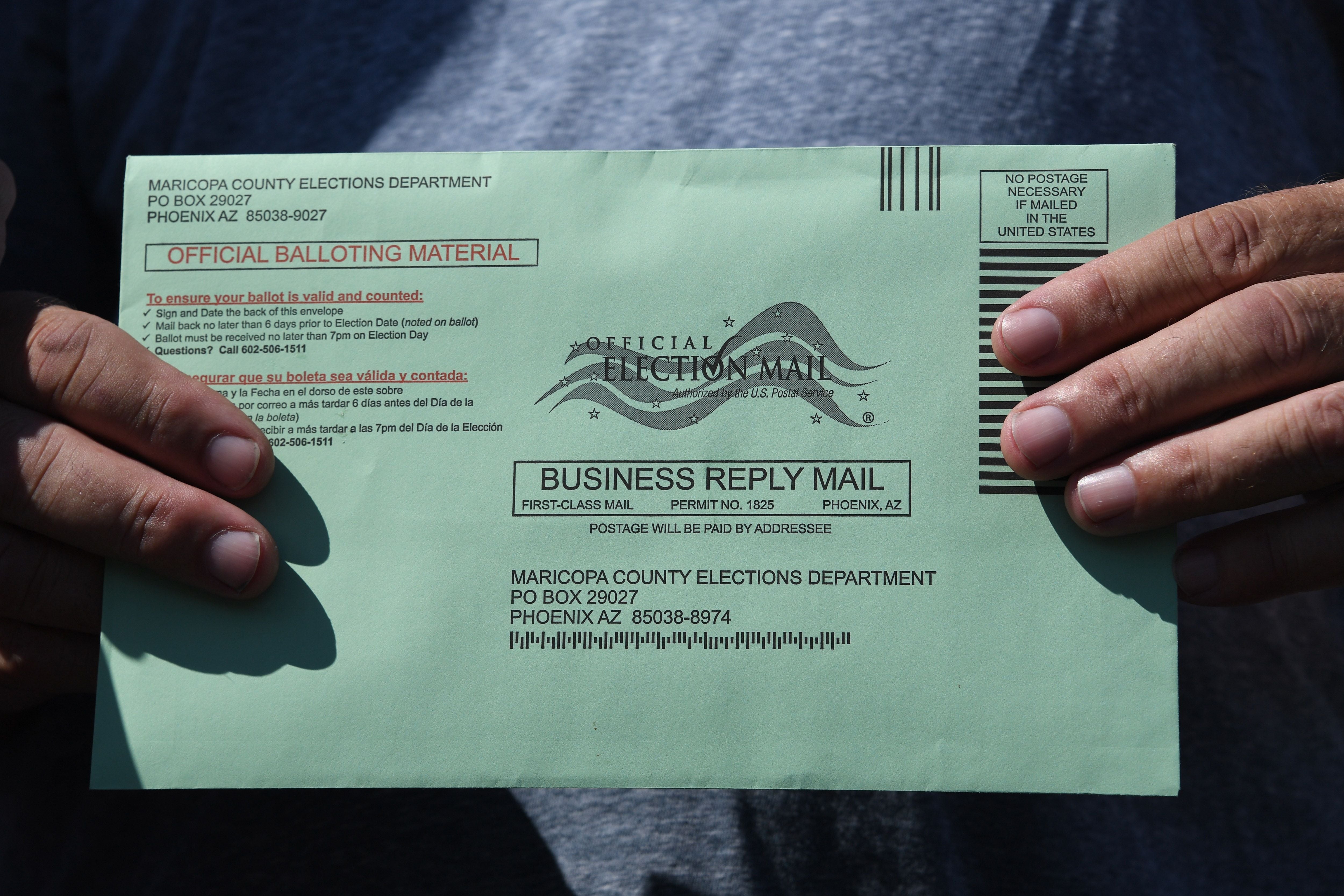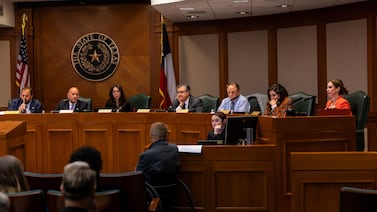Republicans made Arizona an early vote-by-mail innovator in 1991, enacting one of the first laws in the country permitting voters to send in a mail ballot early without an excuse. The state then doubled down, setting up a system in 2007 for voters who wanted to automatically and permanently get ballots in the mail.
The method has become widely popular in the state, with about 89% of Arizona voters casting ballots early, mostly by mail, in the 2020 general election. But now, some Republicans in the state are doggedly attempting to dismantle the system their party helped create.
There’s the ongoing court case filed by the Arizona Republican Party challenging the constitutionality of no-excuse mail-in voting. There’s the new law and ballot referendum backed by Republicans in the Legislature and passed on party-line votes that intend to limit or restrict voting by mail. And there are calls for state lawmakers to take a final vote on an extreme and sweeping measure that would, among other things, eliminate all early voting in the state.
On Monday, a Mohave County Superior Court judge ruled against the Arizona Republican Party on a related court case, stating that the state’s vote-by-mail system is constitutional.
But Arizona voters should not expect the fight to end.
Arizona Republican Party Chairwoman Kelli Ward said on far-right news outlet Real America’s Voice on Monday that the party is “probably going to be appealing to a higher court.” If appealed, the next stop would be the state’s Court of Appeals or Supreme Court.
The efforts are fueled by inaccurate claims promoted by former President Donald Trump: That voting by mail is not secure and mail-in voter fraud caused his 2020 loss to President Joe Biden. Multiple court cases and investigations in Arizona and across the country failed to find any evidence of widespread voter fraud in 2020, and Republican election officials here and elsewhere have repeatedly defended the security of mail-in voting and the integrity of the election.
The decades-long efforts to expand vote-by-mail in Arizona were bipartisan.
In an interview, former Maricopa County Recorder Helen Purcell, a Republican who was in office when no-excuse mail voting became legal, told Votebeat that voters themselves pushed the state to make voting by mail easier, and Republicans encouraged the system from the start. Former Gov. Jan Brewer, a Republican who was a state senator at the time the Legislature voted to approve the no-excuse mail voting system, told Votebeat she’s “very proud” of what her party helped create.
Republicans in the state overwhelmingly use it. Of the more than 1 million Republicans who voted in the 2020 general election, more than 80% are on the state’s early voting list, according to Phoenix-based Republican consulting group HighGround.
“Prior to 2020, early voting heavily favored Republicans — particularly in the early returns,” Paul Bentz, senior vice president at HighGround, said in an email. “The data would start much older and heavily Republican and then trend younger and more Democratic as the election drew closer. The last cycle was the first time Democrats surpassed Republicans in early voting going into Election Day (they ultimately caught up).”
But state-level Republicans are nonetheless leading the charge to break mail voting down.
In response to the court decision Monday, House Democratic leader Reginald Bolding, a candidate for secretary of state, said the case “underscores the increasingly desperate and absurd lengths that right-wing extremists have gone to convince themselves that Donald Trump was not beaten in 2020, and to put their thumb on the scale for 2022 and beyond.”
Arizona Led Way in Mail Voting
Western and Southwestern states, in particular, have led the nation on mail-in voting initiatives.
Oregon in the early 1980s was the first state to test out all-mail elections, said Priscilla Southwell, a political science professor at the University of Oregon. California in the 1980s became the first state to allow for no-excuse vote-by-mail and Washington state enacted no-excuse mail voting a year after Arizona, in 1992.
Even today, no-excuse absentee voting is still much more common in Western states, according to the National Conference of State Legislatures. Voters can vote by mail without an excuse in 26 states and Washington, D.C.
Oregon’s original mail-voting test started as a way to reduce costs by reducing the number of polling places and election workers, Southwell said, and voters there now overwhelmingly support it..
The geographic expanse of Western states, which leads to many rural voters traveling long distances to the polls, is part of what boosted the idea, Southwell said. But these states also have many retirees who like the convenience of voting by mail, she said — pointing out that these are more likely Republican voters. Young voters with busy schedules also appreciate the system, she said.
Before passing its no-excuse law in 1991, Arizona for decades allowed specific types of voters to vote by mail. For example, active military personnel were first permitted to vote early by mail in 1918.
In 1925, the state began allowing people who would be out of the county on Election Day to vote early by mail. In subsequent decades, it was expanded to other groups, such as disabled voters and voters over the age of 65.
The push to more widely expand mail voting in the early ‘90s came not from politicians, but from voters themselves, said Purcell, who was Maricopa County’s recorder from 1988 to 2017.
“People kept coming to us and saying, ‘How come I can’t do it?’” Purcell said.
The requests came in from snowbirds who didn’t live in Arizona during the primary election and older adults who didn’t want to go to their polling place in the heat, Purcell said.
And many of those voters, she said, were Republicans.
Early Opponents Not Influenced by Politics
During the 1991 legislative session, Purcell said, county recorders got together and pushed the Legislature to adopt the no-excuse mail voting law. The bill was sponsored by a Republican, according to the Arizona Mirror, and passed with nearly unanimous support.

Brewer, the former Republican governor and secretary of state, said she remembers there was some debate in the Legislature over whether to change the system, but without particularly partisan overtones.
“It was more of the feeling of ‘red, white and blue’ democracy, we should all show up on Election Day,” Brewer said in an interview.
Historically, voting by mail, and getting voters on the permanent early voting list, was always more popular with Republicans and the Republican Party in Arizona, Purcell said. “The party really did push it,” she said.
Prior to the creation of the early voting list, Bentz with HighGround said, most GOP campaigns conducted their own early ballot request efforts, sending voters direct mail that had self-addressed, pre-paid return cards included.

Voting by mail steadily increased in the ‘90s and early 2000s. But it wasn’t until 2007 that it became widely popular, when the state established what was called the Permanent Early Voting List. Voters were then able to choose to automatically receive a ballot in the mail.
Arizona voters now rely on the system.
Bullhead City resident Ann Tosh wrote to Mohave County Superior Court Judge Lee Jantzen, the judge presiding over the GOP case, emphasizing that she was “extremely concerned” at the possibility of banning mail-in voting.
Tosh told Votebeat that she was a lifelong Republican until just after the 2020 election, when she was turned off by the party’s unfounded claims of voter fraud, and she has voted by mail in every election since 1988.
The first few years, as a Tennessee resident, she was able to vote by mail because she was living overseas, she said. She moved to Arizona in the early 1990s and has been using the no-excuse system since then.
She asked Jantzen to consider the needs of older and disabled voters and working voters with conflicts, the state’s long history of voting by mail, and the low incidence of voter fraud. She told Votebeat there is no good reason to get rid of a system that encourages more voter participation.
“I am appalled at what I see taking place as I watch our democracy and freedoms being systematically eliminated,” she wrote to Jantzen.
Roughly 75% of Arizona voters are on the state’s early voter list as of a few weeks ago, which means they will automatically be sent a ballot in the mail. The deadline for voters to request a one-time ballot in the mail or join the early voting list is July 22 for the Aug. 2 primary.
Early voting jumped for the 2020 primary election, when more than 90% of voters voted early for the first time. The state doesn’t know exactly how many of those early voters cast their ballots by mail versus in person, because it’s not something counties report. But anecdotally, most of Arizona’s early voters send their early ballots back in the mail.
Efforts to Restrict Vote-By-Mail
Over the past year, Republicans have made some progress restricting mail voting, including beginning to chip away at the early voting list.
In May 2021, Ducey signed a law that removed the “permanent” feature of the list. Under the new law, if a voter on the list doesn’t vote early at least once during two consecutive election cycles, election officials must send them a notice that they will be removed from the list if they don’t act.
Republicans said at the time that the measure is meant to ensure the early voting list stays accurate.
There’s debate over whether the new law is retroactive or not and therefore over when voters will first be notified they will be taken off the list. Secretary of State Katie Hobbs’ office believes voters should be notified after the 2026 election cycle, but Attorney General Mark Brnovich’s office argues they should be notified after the 2022 cycle.
In another effort Republicans say was aimed at preventing voter fraud, in February the Legislature approved a ballot measure for November in which voters will be asked whether to require people casting early ballots to provide more identification.
Voters will have to provide some identifying number on their mail-in ballot — such as their driver’s license number, the last four digits of their Social Security number or their voter identification number — or the ballot won’t be counted.
In Texas, a similar law enacted last year has resulted in a high percentage of absentee ballot applications being rejected in some counties.
In the GOP court case that Ward has said may now be appealed to a state court, the party argued that the state’s no-excuse early voting system violated the state Constitution’s requirements for ballot secrecy.
Jantzen concluded Monday that was not the case. He said state lawmakers were legally able to enact the 1991 no-excuse early voting law.
He cited several ways in which state law ensures ballot secrecy, such as requiring ballot envelopes that don’t reveal voter selections and would show evidence of tampering
“It is important to note that this case is not about allegations of fraud in the voting process,” Jantzen wrote. “It is not about politics. It is not even about whether the parties believe mail-in voting is appropriate. It is about one thing: Is the Arizona legislature prohibited by the Arizona Constitution from enacting voting laws that include no-excuse mail-in voting? … The answer is no.”
Purcell called the state GOP’s mission to disband early voting “ridiculous.” She defended the vote-by-mail system as being safe, and touted the county’s multi-layered and bipartisan verification process for the voter signatures required on early ballots.
“It’s always been a very secure system and I think it still is,” she said.
Brewer also criticized the party’s efforts on the matter, saying she has “no idea why” they are doing this.
“They are undermining the integrity of the election,” she said.
Jen Fifield is a reporter for Votebeat based in Arizona. Contact Jen at jfifield@votebeat.org.






